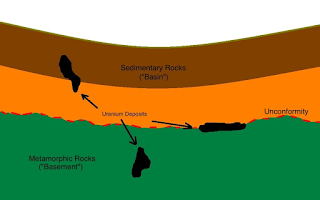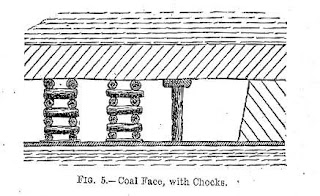Mining Geology
Mining Geology
Introduction
What is mining? Mining is the process of excavating minerals of economic value from the earth’s crus for benefit of mankind. Here we can assume that the earth’s crust, the outer surface of the earth, including the oceans, lakes and rivers, extends to depths of 30 to 50 km or so. For mining operations, one should have a working knowledge of geology.
The word geology means the science of the earth and deals with the natural origin of the rocks that constitute the earth. A person interested in the extraction of minerals from the earth is, however, concerned with the thin surface of rocks that make up the earth crust to a depth of a maximum of 5 km so that geology enables him to locate, and to decide, the sites most economics form mining or quarrying.
In geology, the terms minerals and rock have precise but different meanings. A mineral is a homogeneous and naturally occurring substance having definite physical properties and a composition that may be expressed by a chemical formula. The chemical composition of a mineral as found in the earth, may be the same as that of an artificially prepared chemical compound in the laboratory but the physical characteristic may differ; e.g. lead sulphide, PbS, is generally available in the laboratory as an amorphous powder. It has quite different physical properties from galena, Pbs the name of the naturally occurring mineral, often in the crystalline form. Few minerals occur as single elements, e.g. native gold, silver graphite, but most minerals as single elements in chemical composition,, e.g. quartz (SiO2), hematite (Fe2O3) etc. Most rock-forming minerals are oxides, chlorides, sulphides, carbonates, sulphates or silicates. A rock may be composed of one mineral only but is usually a mechanical mixture or aggregate of two or more minerals. For example, granite is a rock composed essentially of three separate minerals; quartz, feldspar and mica. Whereas minerals can be considered as aggregates of chemical elements, so rocks are really aggregates of minerals. They contain minerals in varying proportions, and they have no definite chemical composition.
Bedrock is any rock lying in the position in which it was formed; it is therefore not broken up.
Country rock of an orebody is that rock that is predominant in the area and which contains the orebody. The country-rock forms the footwall and the hanging wall.
A seam is a mineral deposit limited by two, more or less parallel planes, a shape that is typical of sedimentary rocks. The term is generally used for coal, e.g. coal seam.
When excavating a useful mineral, the uneconomic rock or mineral associated with it which has to be excavated and discarded is called rejection, dirt or waste in coal mining practice and gangue in metal mining practice.
An ore is a rock that contains minerals and which can be used for economical extraction of metal after processing to separate mineral from the gangue. Ore usually occurs in veins or lodes.
If an ore when subjected to metallurgical processes, yields only one metal, it is called a straight ore.
A mineral deposit is a rock or mineral that is of economic value and repays its extraction from the earth.
A vein (or lode) shown in the figure below is a crack in the earth's crust filled with minerals. This filling can occur by precipitation of the mineral from the mineral-rich water or by the cooling of the magma filling the crack or by the separation of the mineral from vapours and gases rising up the crack. Vein, like seams, have a strike, a dip and a thickness but for the same vein, all these are usually quite variable.
 |
| vein or lode |
A number of nearly parallel veins constitute compound lodes.
Orebody, the part of a vein that carries the ore. Generally, all parts of a vein are not ore.
Note that:
The country-rock contains the vein;
The vein contains the orebody;
The orebody contains the ore;
The ore contains the minerals;
The mineral contains the metal or metals.
keywords:
mining geology, minerals and rocks definition in mining, the difference between rock and mineral, bedrock, seam, coal seam, country rock, vein, orebody, ore, mineral contains the metal or metals









Comments
Post a Comment